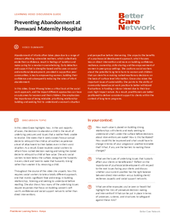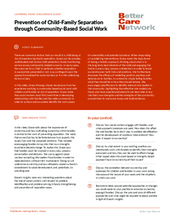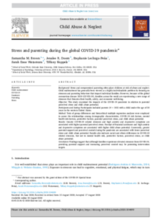Displaying 111 - 120 of 947
In this video, Grace Mwangi takes a critical look at the social work approach to the prevention of child abandonment, and the impact different approaches can have on outcomes for women and their children.
In this video, Grace Mwangi shares key lessons from her experience working in community-based social work with children and families at risk of separation in Kenya.
Comprised of videos and accompanying discussion guides, this video series features the learning from practitioners working across a range of care-related programs and practices in Kenya.
this study relied on organizational survey data collected from child welfare workers and supervisors during the process of implementing an evidence-based practice—the Positive Parenting Program—and merged those data with data gathered by the Parents' Assessment of Protective Factors survey.
This paper provides a critical commentary on approaches to assessments of the capacity of parents of disabled children. International review of literature on this subject matter is enacted across three themes.
This evaluation study examined a Family Services Centre (FSC) operating in a socio‐culturally deprived suburban area of Southern Italy to explore how promoting innovative practices to meet increasingly complex family needs.
This paper explores kinship and other networks of support for young mothers and their babies after an unintended, ex-nuptial pregnancy in a resource-poor urban setting.
The aim of this study was to assess parents' satisfaction and perceived usefulness of the Incredible Years® (IY®) parenting programme in the Child Protection Services (CPS) context, where children's behaviour problems are common.
This study examined the impacts of the COVID-19 pandemic in relation to parental perceived stress and child abuse potential.
The aim of this study was to examine the experiences of mothers regarding their mothering role after participation in the ‘Mamma Trots Allt’ (MTA) program, a support program for mothers with cognitive limitations who have children in placement.



